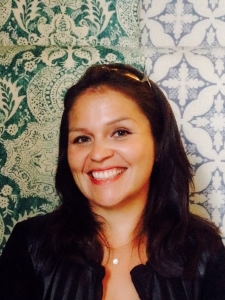Understanding the Health Landscapes where Latinx Immigrants Establish Residence in the United States.”
Health Affairs. 40(7): 1108-1116.
Previous Spatial Demography and Migration
Health Affairs. 40(7): 1108-1116.
Developmental Psychology.
The Journal of Marriage and Family

Graduate Student Fellow
I am a Ph.D. student in the Department of Economics at UC Santa Barbara. I hold a BA and a MA in Economics from the São Paulo School of Economics - Fundação Getúlio Vargas. I am originally from São Paulo, Brazil. My primary research interests are Environmental Economics, Demographics and Macroeconomics. My current research focuses on the macroeconomic and demographic effects of environmental shocks, in particular volcanic eruptions. Previously to my Ph.D I have worked in the asset management and insurance industries.

Graduate Student Fellow
Jimena Rico-Straffon is a Ph.D. Candidate in Economics at UC Santa Barbara. Her research interests lie at the intersection of environmental, development, and labor economics. Her current research estimates the effects of water shortages on urban households using administrative and survey data from Mexico City. Her research also studies the effects of forest policies on deforestation and degradation in tropical forests. Jimena holds a Master of Public Policy from Duke University and a B.A. in Economics from Instituto Tecnológico Autónomo de México (ITAM). education.
Grants, Awards and Distinctions:
Deacon Fellowship, UCSB Economics Department
UC MEXUS- CONACYT Doctoral Fellowship (2019-2024)
UC Berkeley and Alfred P. Sloan Foundation, Diversity Fellowship for participating in the Berkeley/Sloan Summer School in Energy and Environmental Economics, $1,000
CAF Development Bank of Latin America, Research Grant on Sustainable Development in Latin America and the Caribbean, co-PI, $6,000
Outstanding Undergraduate Teaching Assistant, UCSB Economics (2023)

Graduate Student Fellow
Ruth Morales is a Ph.D. student in the Department of Economics at UC Santa Barbara. Before starting at UCSB, she earned both a B.A. and M.A. in economics from San Diego State University. Her primary research interests are in labor economics and public economics. She is especially interested in investigating outcomes related to education, crime, and immigration policies. Her current lines of research focus on the demographic effects of the Bracero Program and on the impact of college-level remedial education reform in the community college system.

Graduate Student Fellow
Adam Burston is a Ph.D. student in the Sociology Dept. with an emphasis in Information, Technology, and Society. His work lies at the intersection of gender, race, and social movement studies. His dissertation research focuses on the strategies that conservative and right-wing activists employ to form multi-racial coalitions, mobilize in digital and physical spaces, and enact social change. He is also assisting Drs. Sarah Thébaud and Brenda Major on research that addresses the impact of normative gender stereotypes in America. Before Adam came to UCSB he was a research associate with Carnegie Mellon’s Dept. of Engineering and Public Policy and a volunteer crisis counselor with Pittsburgh Action Against Rape (PAAR).

Graduate Student Fellow
I am a PhD student in the Department of Economics at UCSB and a National Science Foundation Graduate Research Fellow. Before coming to Santa Barbara, I earned a B.A. in International Relations with a concentration in Economics from Wellesley College, and did research on labor, housing and education at Abt Associates. My current research interests include labor, social policy, and increasingly, economic history, along with applied econometrics. I am working on a project concerning interracial interactions during the Jim Crow era of the American South.
Group Processes and Intergroup Relations, 1-21. doi: 10.1177/1368430220944222.
Personality and Social Psychology Bulletin, 1-12. doi: 10.1177/014616722C928859.